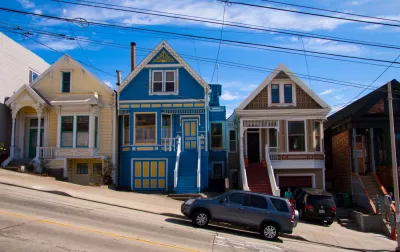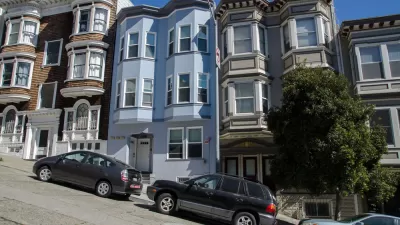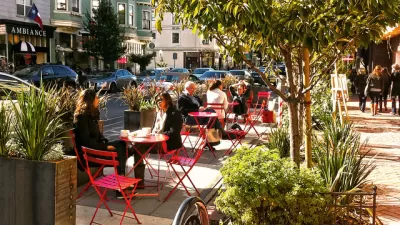A proposal under consideration by the San Francisco Board of Supervisors would eliminate parking requirements citywide.

"San Francisco is poised to become the first big U.S. city to no longer require developers to include at least some parking in their housing developments," reports Joshua Sabatini. San Francisco would follow Hartford, Connecticut—the first city to end parking minimums citywide—and Buffalo, New York, which also passed similar legislation, with a few caveats.
For the city to implement this drastic overhaul of its parking requirements, it will have to pass legislation introduced by Supervisor Jane Kim, who recently discussed the proposed legislation at a public hearing.
“It would not prohibit parking in any redevelopment. It would merely remove the requirement that a developer would have to build a minimum number of parking spaces,” Kim said during Monday’s Land Use and Transportation Committee hearing.
Kim also says that the city is already working around parking requirements for most developments.
Arielle Fleisher, a representative for public policy think tank SPUR, is also quoted in the article discussing the benefits of ending parking requirements.
“There is no good reason for the city to force the private market to produce parking spaces for every housing unit built,” said Arielle Fleisher, a representative for public policy think tank SPUR. “Eliminating minimum parking requirements reduces the cost of producing new housing and enables us to use our land more efficiently by replacing spaces for cars with spaces for people.”
More advocates are cited in the article as supporting the legislation. The full San Francisco Board of Supervisors is expected to vote on the bill next week.
FULL STORY: SF to do away with minimum parking requirements for developments

Manufactured Crisis: Losing the Nation’s Largest Source of Unsubsidized Affordable Housing
Manufactured housing communities have long been an affordable housing option for millions of people living in the U.S., but that affordability is disappearing rapidly. How did we get here?

Americans May Be Stuck — But Why?
Americans are moving a lot less than they once did, and that is a problem. While Yoni Applebaum, in his highly-publicized article Stuck, gets the reasons badly wrong, it's still important to ask: why are we moving so much less than before?

Research Shows More Roads = More Driving
A national study shows, once again, that increasing road supply induces additional vehicle travel, particularly over the long run.

Judge Halts Enforcement of Anti-Homeless Laws in Grants Pass
The Oregon city will be barred from enforcing two ordinances that prosecute unhoused residents until it increases capacity and accessibility at designated camping sites.

Advancing Sustainability in Los Angeles County Schools
The Los Angeles County Office of Education’s Green Schools Symposium brings together educators, students, and experts to advance sustainability in schools through innovative design, climate resilience strategies, and collaborative learning.

Using Old Oil and Gas Wells for Green Energy Storage
Penn State researchers have found that repurposing abandoned oil and gas wells for geothermal-assisted compressed-air energy storage can boost efficiency, reduce environmental risks, and support clean energy and job transitions.
Urban Design for Planners 1: Software Tools
This six-course series explores essential urban design concepts using open source software and equips planners with the tools they need to participate fully in the urban design process.
Planning for Universal Design
Learn the tools for implementing Universal Design in planning regulations.
City of Moreno Valley
Institute for Housing and Urban Development Studies (IHS)
City of Grandview
Harvard GSD Executive Education
NYU Wagner Graduate School of Public Service
City of Cambridge, Maryland
Newport County Development Council: Connect Greater Newport





























